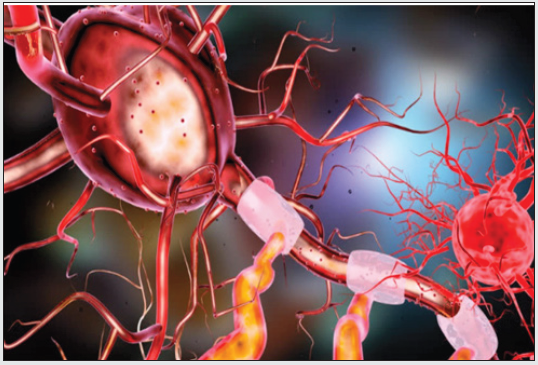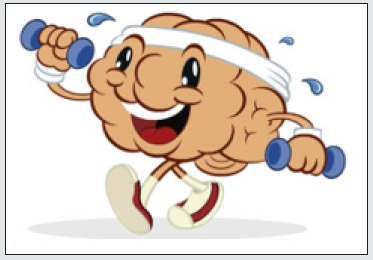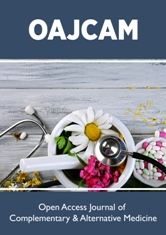
Lupine Publishers Group
Lupine Publishers
Menu
ISSN: 2644-1217
Research ArticleOpen Access
Treatment Performed with The Application of The Multimedia Rehabilitation Technique - Brain Gymnastics, Intense Brain Stimulation to Combat the In Depression, Panic Syndrome, Excessive Anxiety, Disorders and Neurological Sequelae Caused by COVID-19 Affecting the World Population in The Pandemic Volume 3 - Issue 2
Branco, Luciana Maria Depieri*
Department of Neurological Sciences, Brazil
Received:June 30, 2021 Published:July 21, 2021
*Corresponding author:Luciana Maria Depieri, Department of Neurological Sciences, Faculty of Medicine of São José do Rio Preto – SP – Brazil
DOI: 10.32474/OAJCAM.2021.03.000160
Abstract
Now is the most important time to look for alternatives and (Figure 1) treatments relevant to mental health care. This article will present the intensive brain stimulation technique Multimedia Rehabilitation, an important and intense “Academy for the Brain”, where diversified computational activities are developed that stimulate the entire brain, increasing synaptic connections and promoting neurogenesis, the birth of new neurons. In addition, there is a regulation and balance in the hormone’s oxytocin, serotonin, dopamine, endorphins responsible for pleasure and happiness. Thus, the individual starts to reprogram his brain to work intensely, seeking to combat the various diagnoses that harm the emotional system, greatly improving their quality of life.
Mental health was already highlighted before the pandemic, but now the cases have had a relevant increase. People live under pressure all the time without knowing what will happen, what will be the work, if they will lose their job, fear of contracting the disease, generating excessive daily anxiety. All this stress results in a significant increase in certificates and absences from work, causing an intense emotional disturbance that, in some cases, leads people to commit suicide. The Covid-19 pandemic has proven to be a traumatic event for many people, leading to a huge increase in feelings of fear and stress. Social isolation can affect people with special attention, according to the data, women, young people, people who already have a mental problem and, especially, those who have lost their jobs.
Health professionals are also being very psychologically affected at this time, scientific evidence shows that the health team has been experiencing psychological distress with the COVID-19 pandemic, and the intervention of psychological or psychiatric treatments to this population is of great importance, since that mental health care favors the professional’s performance in their work environment, and the absence of this will reduce their care potential, increasing the chances of leaves, dissemination, deaths and consequences after the crisis of this pandemic. Exercising the brain is essential and maintaining the health of the nervous system is essential, especially at this time of global pandemic in which we live. The brain is the body’s control center and needs to be healthy to help us fight everyday problems such as stress, depression, panic disorder, excessive anxiety, burnout syndrome, neurological sequelae caused by COVID-19 and other diagnoses that affect the system emotional. Multimedia Rehabilitation is an intense gym for the brain and causes all areas of the brain to be stimulated simultaneously, so that there is a regulation and balance in hormones, increased synaptic connections and the birth of new neurons, in this way the nervous system passes to function in a healthy and balanced way, promoting a greater and better quality of life for the individual.
Introduction
The brain changes according to what it is used for, this occurs through neuroplasticity. Neural plasticity refers to the ability of the Central Nervous System (CNS) to modify some of its morphological and functional properties in response to changes in the environment. In the presence of injuries, the CNS uses this ability to recover lost functions and/or, mainly, to strengthen similar functions related to the original Theories of neuroplasticity formulated by Merze ich and other contemporary neuroscientists have opened revolutionary perspectives – both for children with learning difficulties and for people with brain damage from trauma or from illnesses such as stroke and other diagnoses. In the 1970s and 1980s, through experiments with animals, Merze ich demonstrated that neuronal circuits and synapses change rapidly according to the activity performed. In one of the trials, he rearranged the nerves in a monkey’s hand and observed that the animal’s sensory cortex cells quickly reorganized to create a new mental map for that limb. The use of new information and communication technologies (ICT) must be seen as a rich source of brain stimuli with dynamic and creative strategies, allowing the individual to create, think and argue. In addition, through challenging activities, we lead the brain to discover new routes, which will favor the exercise of the brain, that is, the two cerebral hemispheres, through brain plasticity, in a dynamic, intense, and active way.
This article demonstrates that the computer can be used as a tool to exercise the brain through diversified activities and be used as an alternative therapy of great relevance, seeking to increase synaptic connections, promote the birth of new neurons, making the brain become intensely reprogrammed to work in a balanced way, helping and fighting many diagnoses, especially those that point to a daily increase during this time of pandemic, for example, excessive anxiety, depression, panic syndrome, burnout syndrome (extreme exhaustion, mental exhaustion, also known as burnout syndrome), Brain Fog (mental confusion, known as “mental fog”, state of mental confusion, forgetfulness and lack of focus). It can be concluded that, with the Multimedia Rehabilitation – Brain Gymnastics – Neurokinesis technique, it is an intense gym for the brain. Its purpose is to use the computer to exercise the brain intensely and actively, increasing synaptic connections, promoting the birth of new neurons through neurogenesis, and balancing the hormones oxytocin, serotonin, dopamine, endorphins responsible for pleasure and happiness.
Through the computer we carry out targeted and diversified activities, increasing the degree of difficulties with each overcoming, in this way we challenge our brain to create new connections, developing neuroplasticity, which is the brain’s capacity to learn and reprogram itself. This competence is present in nerve cells and allows the entire nervous system to adapt to certain situations, such as trauma and injuries.
How Stress Affects the Brain
A racing heart, increased sweating, agitation, and mental confusion are some of the immediate symptoms during a stressful episode. All these physiological changes, however, happen first in the brain. This is because, at that moment, the body perceives a threatening situation and needs to react automatically and almost immediately switches to “fight or flight” mode, the body thinks it is under attack and prepares to defend itself, releasing a complex mixture of hormones.
During an episode of stress, one of the structures triggered by our brain is the hypothalamus, it activates the release of hormones such as cortisol and adrenaline, and they are what prepare our body to defend itself. Currently, the brain also increases the production of endorphin, a substance that has an analgesic effect and makes the body less sensitive to pain. All of this happens very quickly, it’s just a few seconds between the moment you realize you’re at risk and the start of hormones being released by the brain. It is an automatic reaction of the organism, which involuntarily begins to prepare itself to deal with a threat, which may be real or imagined. The Covid-19 pandemic has proven to be a traumatic event for many people, leading to a great increase in feelings of fear and stress. Social isolation can affect people with special attention, according to the data, to women, young people, people who already have some mental condition and, especially, those who have lost their job.
Health professionals are also being very psychologically affected at this time, scientific evidence shows that the health team has been experiencing psychological suffering with the COVID-19 pandemic, and the intervention of psychological or psychiatric treatments to this population is of great importance, since mental health care favors the professional’s performance in their workplace, and the absence of this will reduce their care potential, increasing the chances of leaves, dissemination, deaths and consequences after the crisis of this pandemic. Mental health was already highlighted before the pandemic, but now the cases had a relevant increase. People live under pressure all the time without knowing what is going to happen, how the job will be, if they will lose their job, fear of contracting the disease, generating excessive daily anxiety. All this stress entails as a consequence a significant increase in certificates and absences from work, causing an intense emotional disorder which in some cases leads people to suicide.
We need to think of mental health problems as a public health problem, just like grief. During the pandemic, people began to experience grief more intensely and often in a frustrating way, for example, health professionals who live on the front lines of hospitals, where often in large cities they need to choose the people who will be saved immediately. In addition, people suffer through the grief of their families in an abrupt manner, causing people to despair and start to have their mental health impaired by problems such as depression, excessive anxiety, panic syndrome and other disorders that affect the emotional system. Grief brought about and aggravated states of depression, anxiety, and other mental disorders. In addition, social isolation has caused many people to stay (Figure 2) away from their families, the people they love and changed their routines. Looking at mental health with care today is paramount, and there is a great need to create pioneering intense brain stimulation programs with fast and accurate results, especially with new research that points to neurological disorders caused by COVID-19, we need to be attentive and vigilant with health worldwide, seeking to seek alternative therapies that will be great allies in the treatment of these diagnoses. Everything we are, do, feel, all our behavior reflects the way our brain works. Some diseases alter this functioning. And the brain starts to function in a sick way. “Teaching” the brain to function properly can improve symptoms and end many illnesses. We just need to exercise our brain intensely and reprogram it in a healthy way. Through the assistance of Multimedia Rehabilitation – Brain Gymnastics, it is possible to exercise the entire cerebral cortex simultaneously promoting neurological maturation in a global way in all patients who receive the assistance. Brain Gymnastics can be offered to the world population, for everyone who wants to stimulate their brain intensely and seek to keep their mind healthy, especially taking care of diseases that affect the nervous system in general and in this case, especially people who suffer from Depression, Panic Syndrome, Excessive Anxiety, Burnout Syndrome, Brain Fog, Neurological and Psychiatric Disorders caused by COVID-19 and other illnesses that affect the emotional system in general.
Anxiety and depression are different problems, each with its own characteristics, but in many cases these two conditions can affect the same person. We know that both anxiety and depression involve behaviors that greatly disrupt the daily routine, causing great social, professional, and interpersonal relationships damage in general. When a person is depressed, it’s because the brain is undergoing chemical changes that trigger all these negative feelings, and he’s going to need help getting back to normal functioning. It is normal for everyone to feel at one time or another negative feelings and discouragement, generally causing a little sadness. The difference is that when there is no depression, the brain can modulate and overcome this negative emotion. When there is depression, some areas of the brain become hyperactive and several neurotransmitters go out of balance, causing a major change in the hormone’s dopamine, serotonin, endorphin and oxytocin. In this way, the person can’t get excited about anything, losing interest in life, work, family, seriously affecting every daily life, often leading to the most extreme act, which is suicide.
In addition, people who suffer from depression and excessive anxiety can develop psychosomatic illnesses, which are emotional or psychiatric disorders that also affect the functioning of the body’s organs. These maladjustments cause many physical complaints, which can arise in different parts of the body. The emergence of these diseases shows a certain complexity, as they can trigger generalized pain, diarrhea or constipation, tremors in the extremities, skin spots, shortness of breath, among other symptoms that cannot be explained by any organic change, as in confirmation tests diagnosis, no disease appears that causes these symptoms. Due to these typical characteristics, physicians generally have great difficulty in diagnosing the cause of these disorders. Therefore, in most cases, guidance is to seek support and treatment for mental rehabilitation.
Multimedia Rehabilitation in the fight against Brain Fog (Cerebral Fog) after COVID-19
Brain Fog is not a medical diagnosis. It’s a general term to describe the feeling of being confused, mentally sluggish. The person begins to experience lack of mental clarity, memory problems, lack of concentration, feeling a little “out of control”, headaches, confusion. Many of us already feel that way, mentally sluggish, for example after a bad night’s sleep or after going through a stressful situation, this is normal. But some people who were infected with COVID-19 and are now cured report experiencing “mental fog” for weeks and even months. It’s becoming known as COVID-19 brain fog: disturbing cognitive symptoms that can include memory loss, confusion, difficulty focusing, dizziness, and difficulty remembering everyday words. Increasingly, Covid survivors say the brain fog is hampering their ability to work and function normally. Scientists are still doing research and aren’t sure what causes brain fog, but they’ve come to the conclusion that it varies widely and affects even people who have had minor symptoms physically from Covid-19 and had no prior medical conditions. The main theories put forward are that mental fog arises when the body’s immune response to the virus does not turn off or occurs due to inflammation of the blood vessels that lead to the brain. But it is still a source of more detailed investigation and research on the subject by scientists.
Some studies indicate that some people may experience symptoms caused by COVID-19 many weeks or even months after having it. Most people who have been infected with the virus end up having mild reactions and the symptoms disappear in about two weeks. For people who have a more severe response to COVID-19, recovery can take three to six weeks.
But there is a growing concern with a group and people who do not fit into the two groups mentioned above. One study state that approximately 10% of people who have had COVID-19 will experience prolonged symptoms for one to three months or more after becoming infected. This group is being called “long-haulers”, it mixes with cases that had mild and severe reactions. This condition can affect anyone, whether young, adult, elderly, those who were healthy, those who had more severe symptoms, those who were hospitalized and those who were not.
It is not possible to determine the average age or predict who may have long- term symptoms. A mix, young people, adults, healthy people as well as older people are in this longstanding group of symptoms. Some symptoms are usually: cough, chest tightness, headache, diarrhea, fatigue, muscle pain. Fatigue is reported by most people by COVID-19 victims with longstanding symptoms, where they present tiredness, discouragement, and exhaustion in everything they do. Many long-haulers report brain fog, difficulty concentrating, as if they were “out of breath”, quite different from how they were before.
Multimedia Rehabilitation – Brain Gymnastics – Neurokinesis is an intense Academy for the Brain and can greatly help the world population regain well- being and recover mental health. The technique aims to use the computer to exercise the brain intensely and actively, increasing synaptic connections and promoting the birth of new neurons through neurogenesis. People who undergo this treatment show relevant results in the first weeks, feeling more secure, happy, willing, and showing greater interest in daily activities, greatly improving their quality of life quickly. Results are quickly noticed when the treatment is carried out frequently at least once a week. People affected by all the above symptoms need to take care of their mental health and seek treatments that increase brain stimulation so that they can have their mental health recovered and sharpened again.

Top Editors
-

Mark E Smith
Bio chemistry
University of Texas Medical Branch, USA -

Lawrence A Presley
Department of Criminal Justice
Liberty University, USA -

Thomas W Miller
Department of Psychiatry
University of Kentucky, USA -

Gjumrakch Aliev
Department of Medicine
Gally International Biomedical Research & Consulting LLC, USA -

Christopher Bryant
Department of Urbanisation and Agricultural
Montreal university, USA -

Robert William Frare
Oral & Maxillofacial Pathology
New York University, USA -

Rudolph Modesto Navari
Gastroenterology and Hepatology
University of Alabama, UK -

Andrew Hague
Department of Medicine
Universities of Bradford, UK -

George Gregory Buttigieg
Maltese College of Obstetrics and Gynaecology, Europe -

Chen-Hsiung Yeh
Oncology
Circulogene Theranostics, England -
.png)
Emilio Bucio-Carrillo
Radiation Chemistry
National University of Mexico, USA -
.jpg)
Casey J Grenier
Analytical Chemistry
Wentworth Institute of Technology, USA -
Hany Atalah
Minimally Invasive Surgery
Mercer University school of Medicine, USA -

Abu-Hussein Muhamad
Pediatric Dentistry
University of Athens , Greece

The annual scholar awards from Lupine Publishers honor a selected number Read More...






